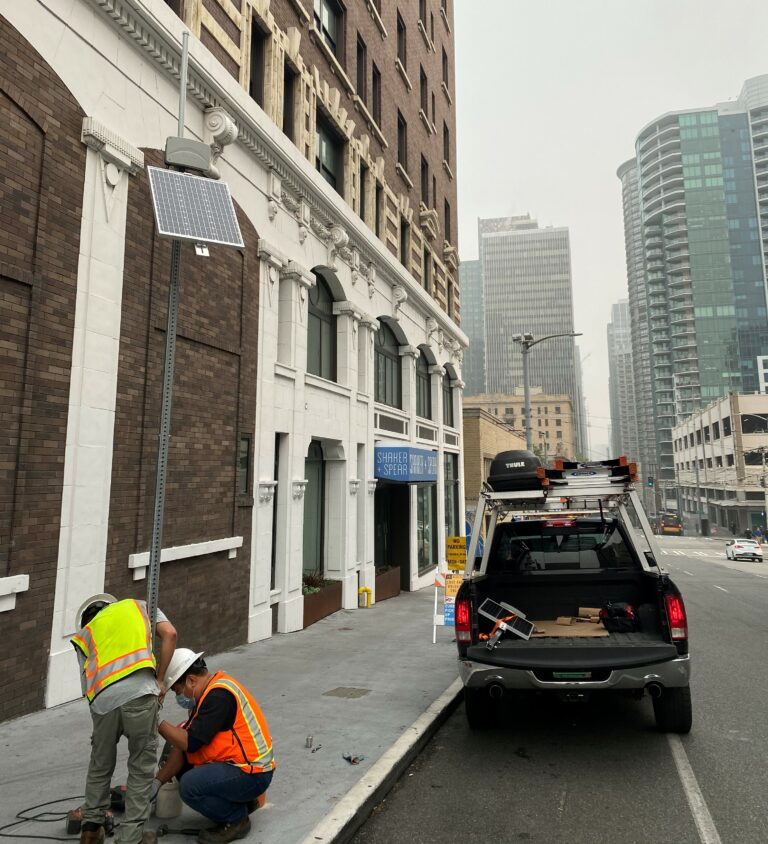
September 18, 2020 — The Urban Freight Lab, Seattle Department of Transportation, and IoT providers Fybr and Lacuna Technologies installed sensors today under the pavement of 274 commercial vehicle load zones in the 10-block Belltown case study area in efforts to improve goods delivery sustainability and efficiency. The new sensor infrastructure is part of an Urban Freight Lab research project on integrating technology to gain efficiency, meet future demand and reduce emissions in the urban goods delivery system, funded by the U.S. Department of Energy’s Office of Energy Efficiency and Renewable Energy (DOE EERE).
The sensors (provided by Fybr) detect commercial vehicle presence and dwell time (the amount of time a vehicle spends parked without moving), and then communicate that data to Urban Freight Lab researchers, who will study delivery vehicle travel patterns. Using a magnetometer and microprocessor, the sensors measure the time a vehicle spends in that space and then send the data via 900 MHz radio to a nearby gateway communication device (provided by Lacuna), which then relays the data to a server via a secure connection on a cellular modem. Fybr and Lacuna were selected by the Seattle Department of Transportation through a request for proposals process. Similar occupancy data are being collected by Cleverciti and Automotus video-analytic systems at a test site at 106th Ave. NE and NE 4th St. in downtown Bellevue.
Ultimately, the Urban Freight Lab will use this data to develop an app that will provide commercial vehicle delivery drivers with real-time data on which commercial load zones are available and, using machine learning, predict when and where parking will become available. The objective is to reduce parking seeking behavior (that’s circling the block looking for parking) by 20% in the pilot test area, reduce dwell time, and increase parking occupancy rates. The project also includes pilot testing common carrier locker systems in Uptown and Bellevue.
READ MORE:
About the project
Year One Progress Report (October 1, 2018 – December 31, 2019)
In the Media:
New Research: Urban Freight Lab Awarded $1.5M DOE Grant (Urban Freight Lab)
Researchers tackle the ‘final 50 feet’ of delivery challenge as online shopping spikes (Geekwire)
Belltown Pilot Test Site Selected for New Freight Management Technologies (Urban Freight Lab)
University of Washington studies future of urban package delivery with lockers and street sensors (Geekwire)
About the Urban Freight Lab (UFL): An innovative public-private partnership housed at the Supply Chain Transportation & Logistics Center at the University of Washington, the Urban Freight Lab is a structured workgroup that brings together private industry with City transportation officials to design and test solutions around urban freight management. Since launching in December 2016, the UFL has completed an innovative suite of research projects on the Final 50 Feet of delivery, providing foundational data and proven strategies to reduce truck dwell times and failed first delivery attempts, lowering congestion, emissions, and costs.
About the Final 50 Feet Research Program: The Urban Freight Lab’s Final 50 Feet research program designs and tests solutions to improve delivery at the end of the supply chain—beginning at a load/unload parking space at the curb, in an alley, or in a private loading bay, and maneuvering through sidewalks, intersections, and building security, and ending with the final customer. This final segment of the supply chain is the most difficult and expensive (estimated at between 25-50% of total supply chain transportation costs) with benefits for cities, retailers, carriers, and customers.
Read more: